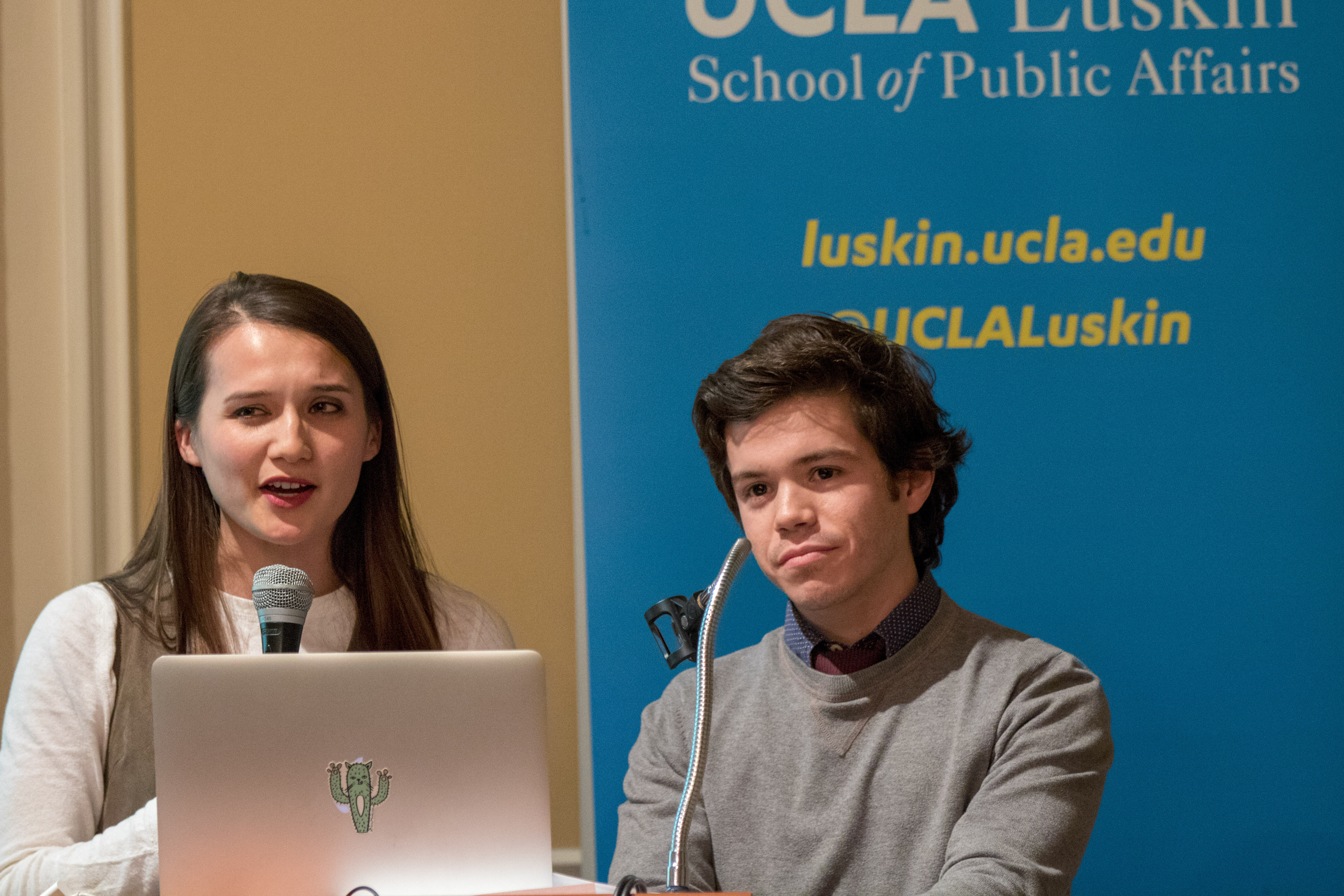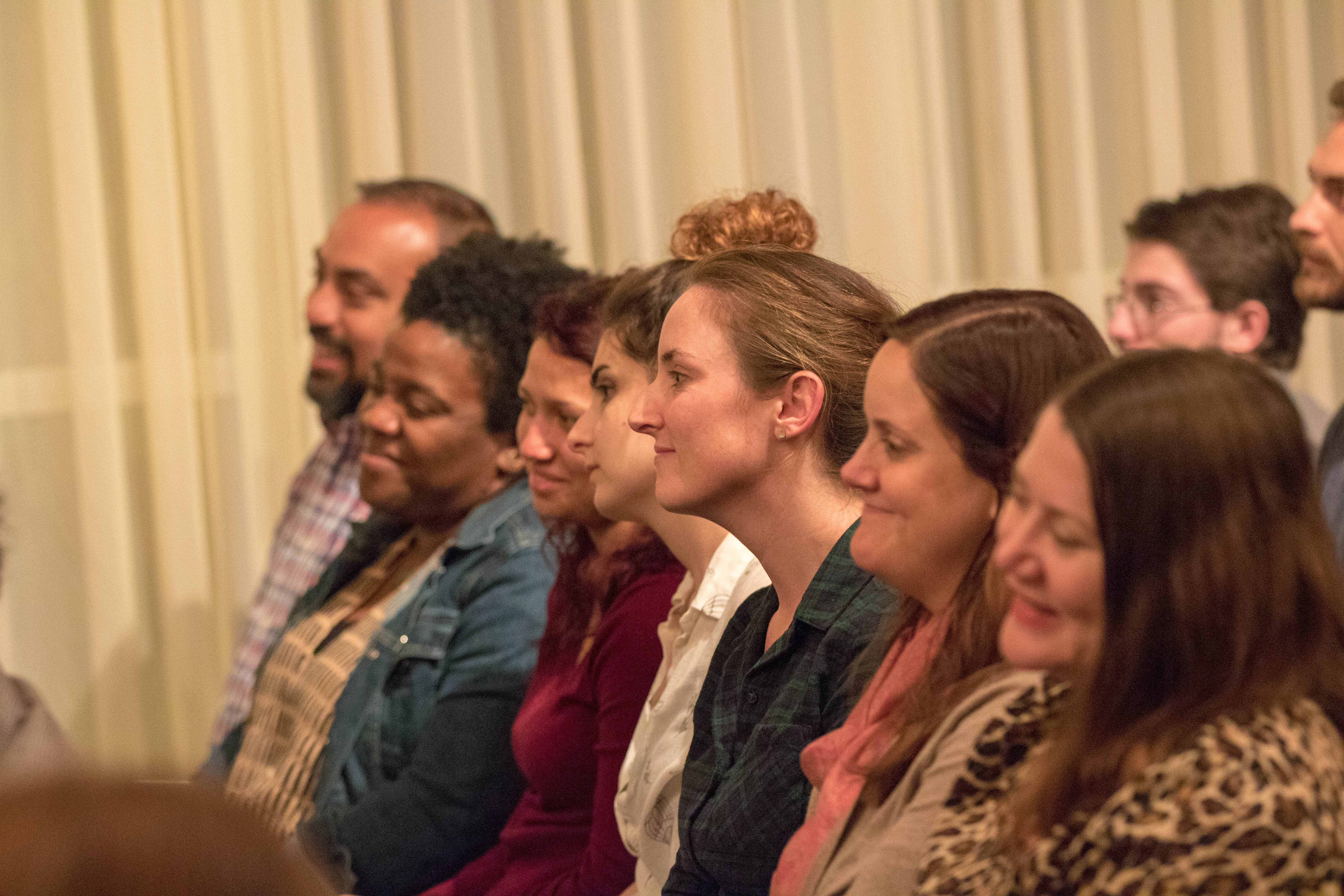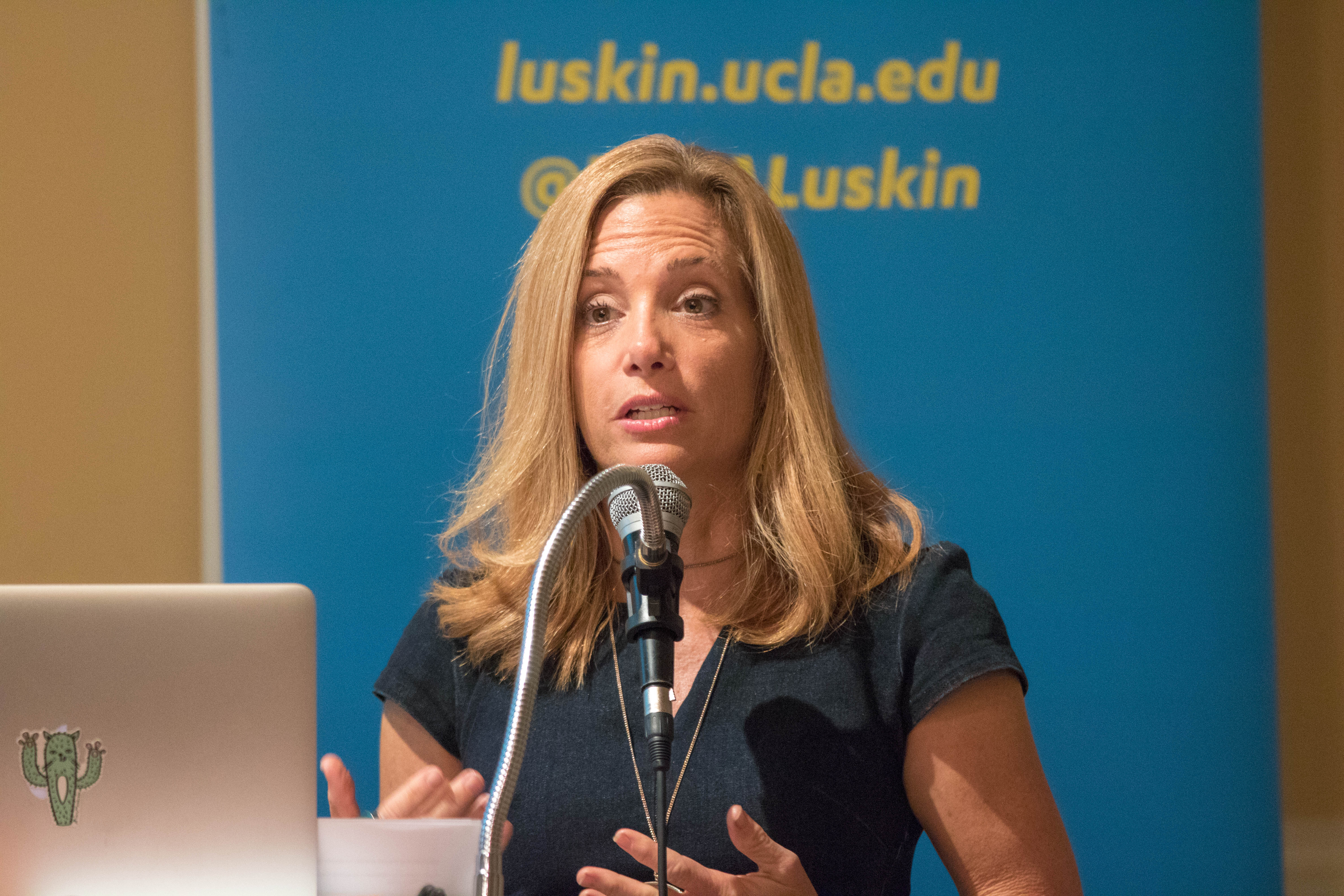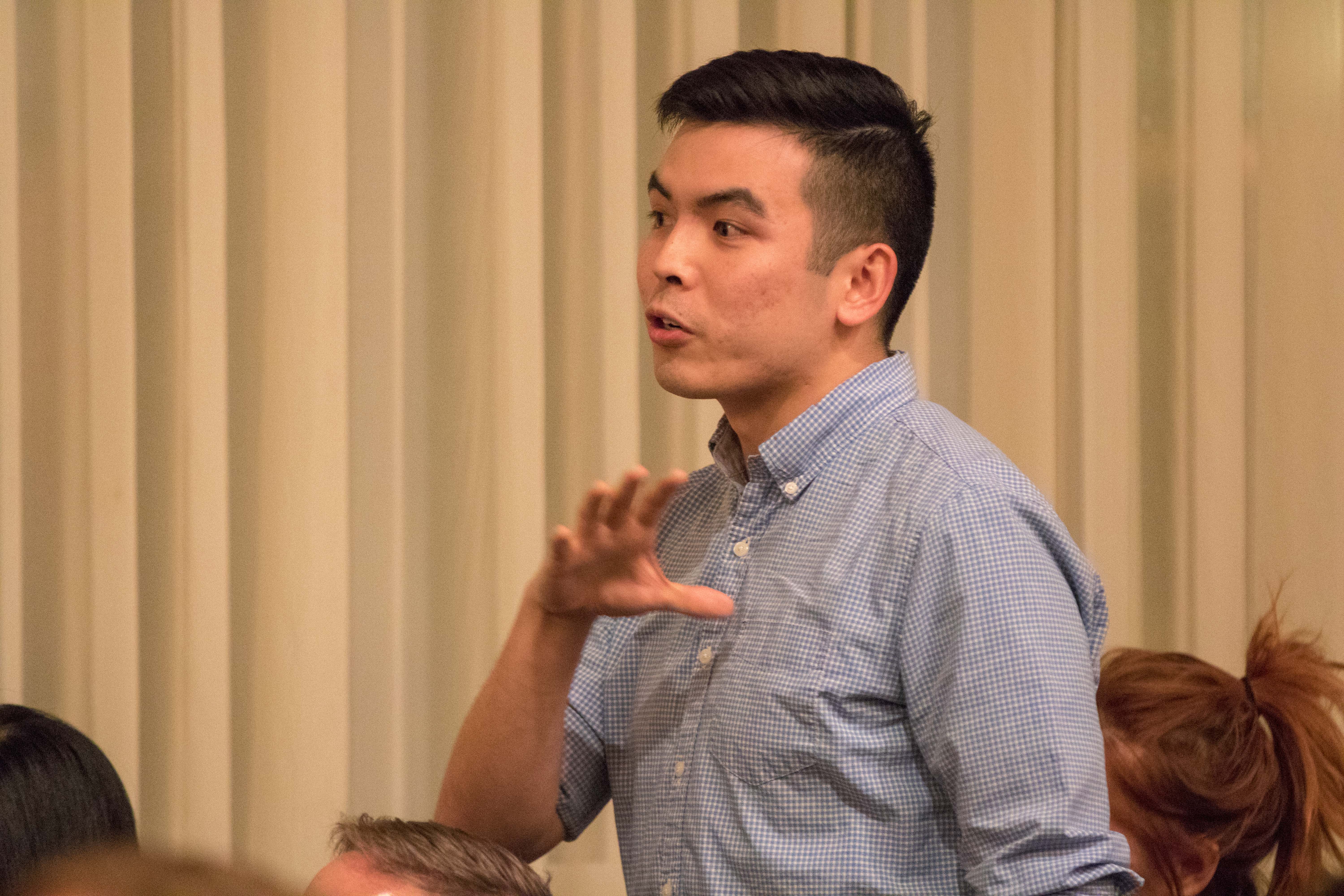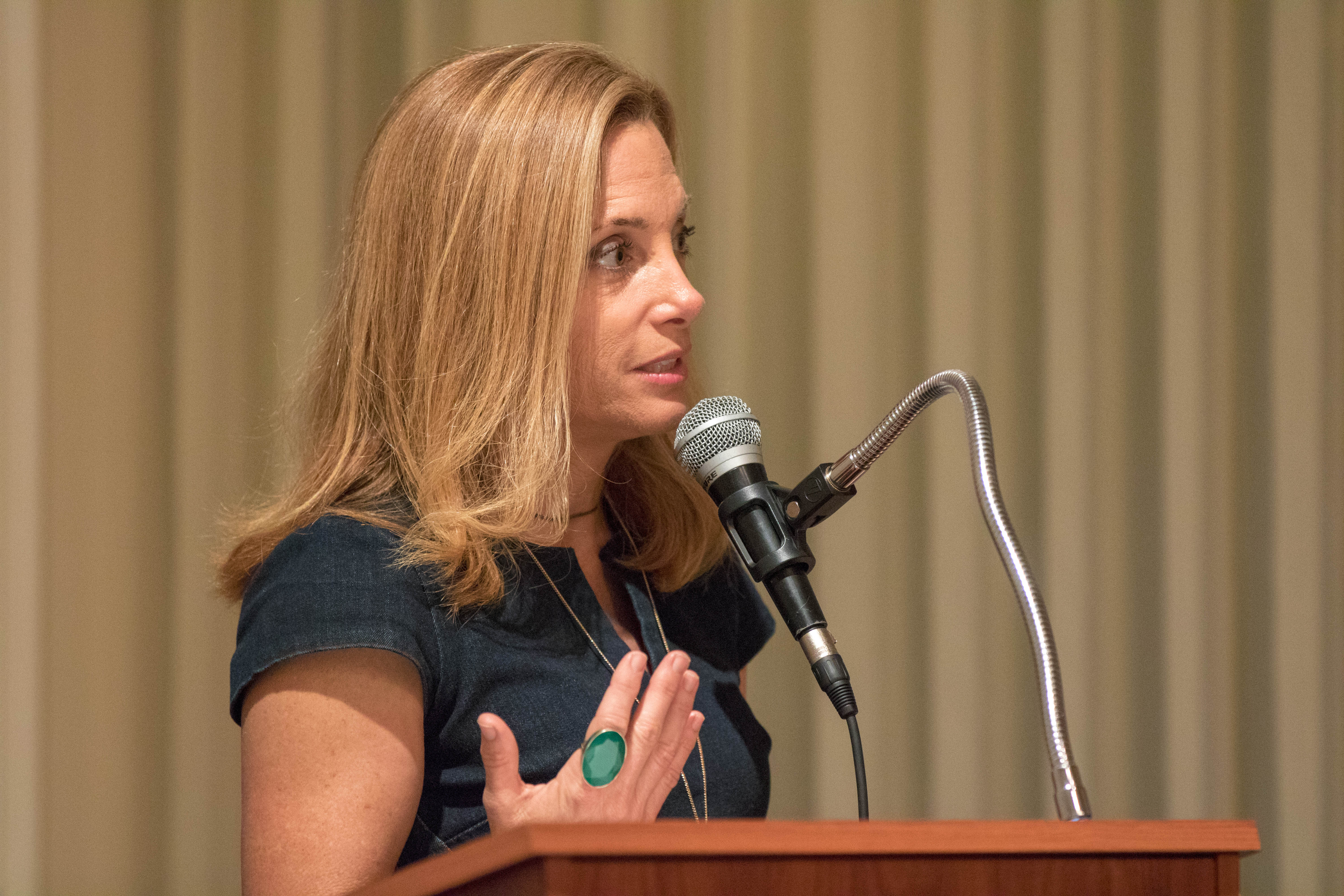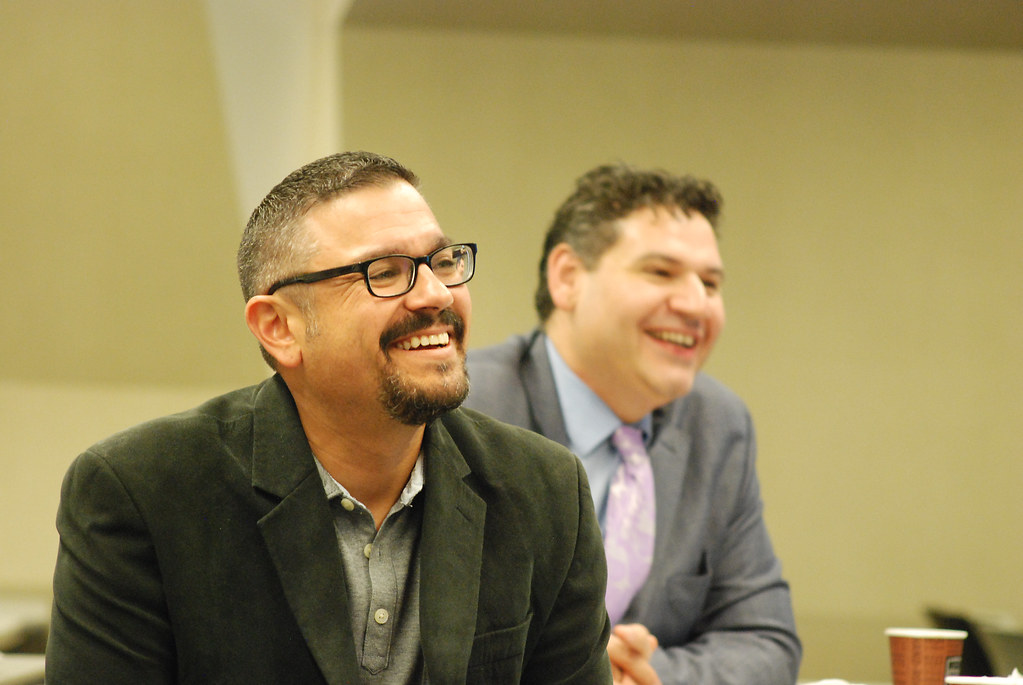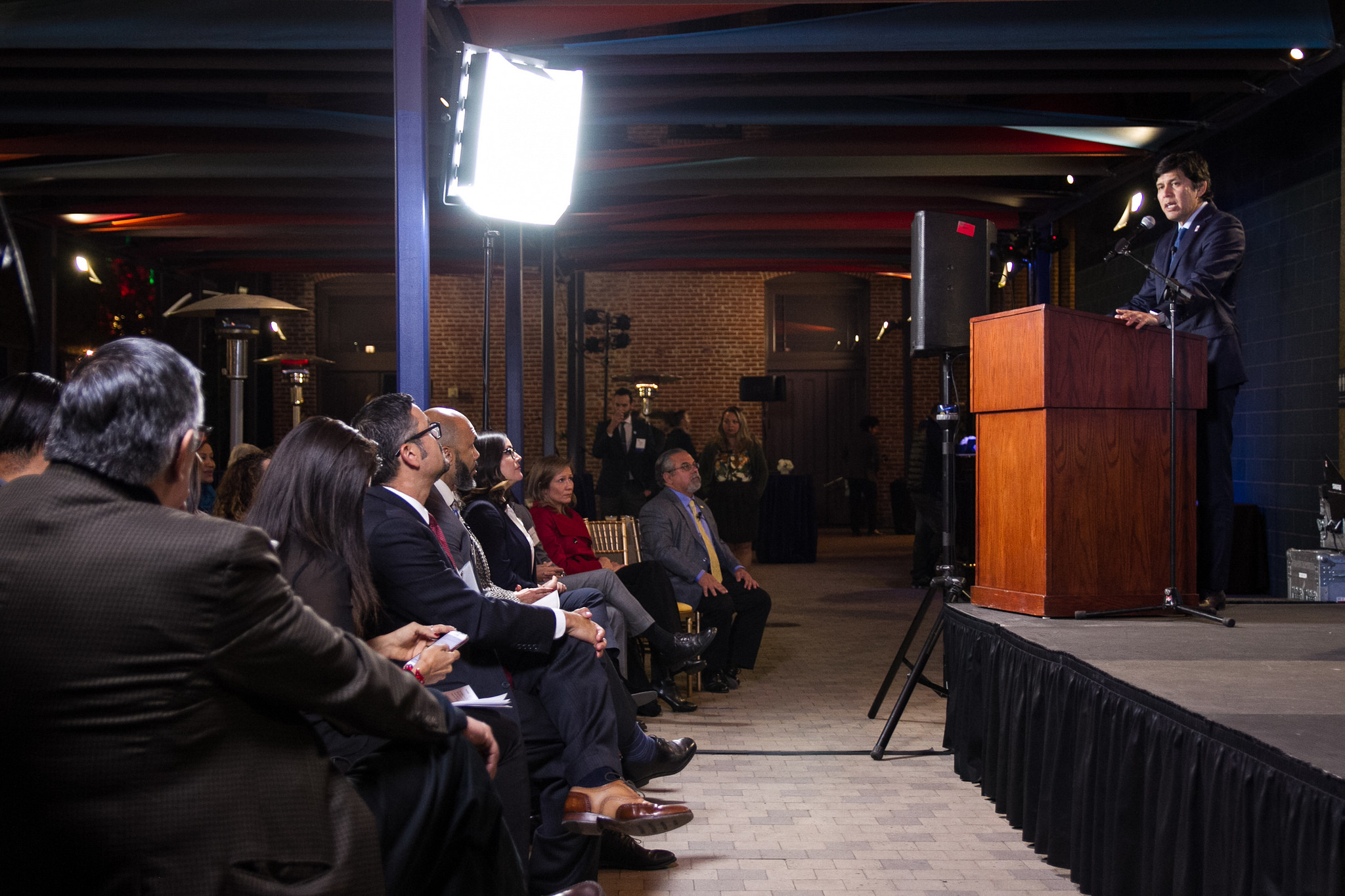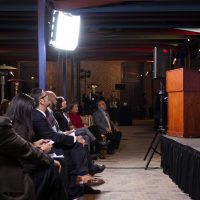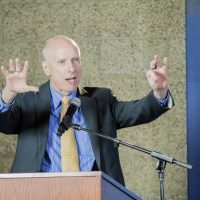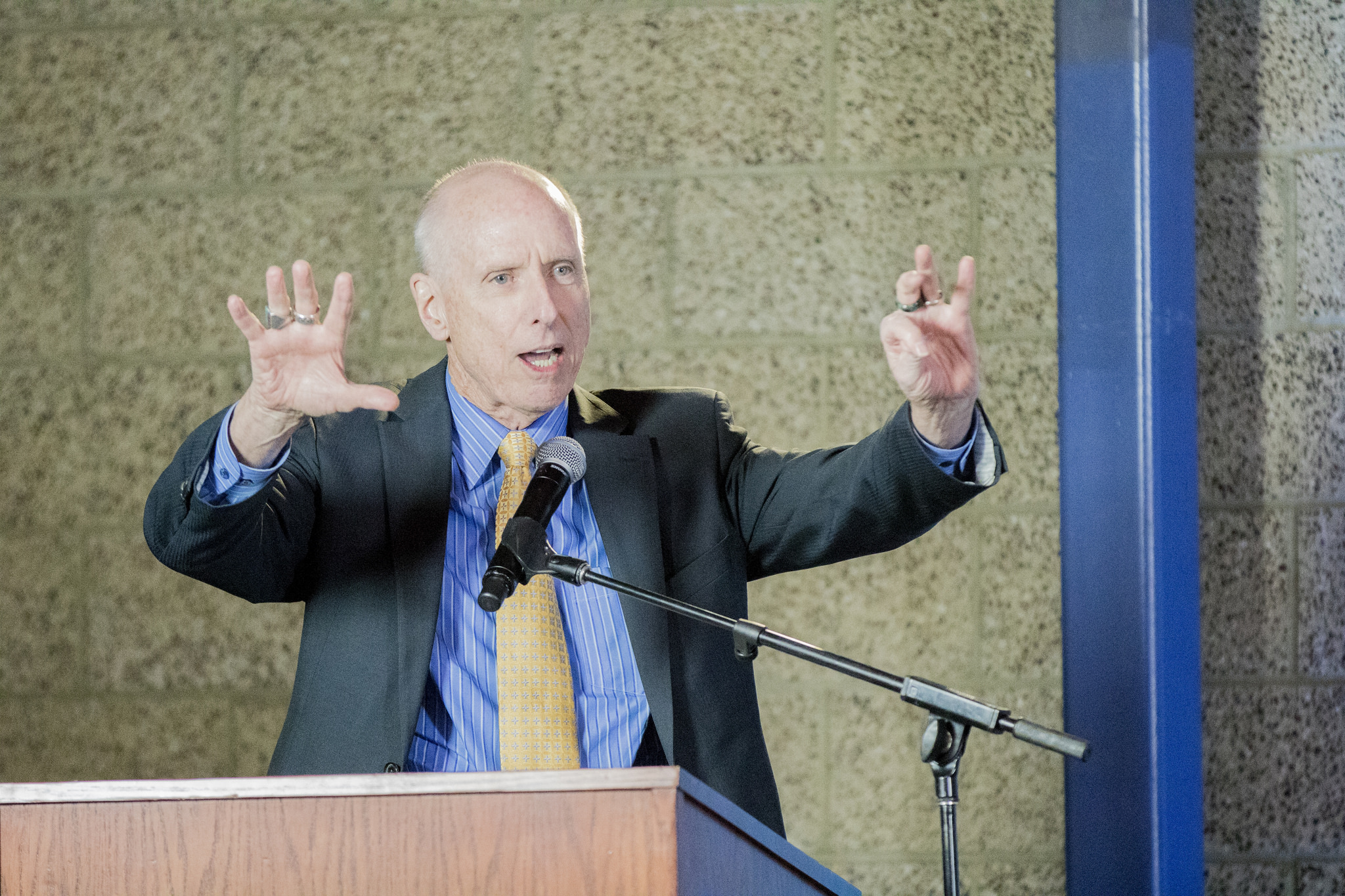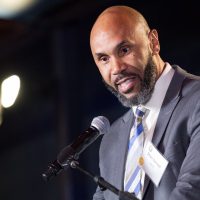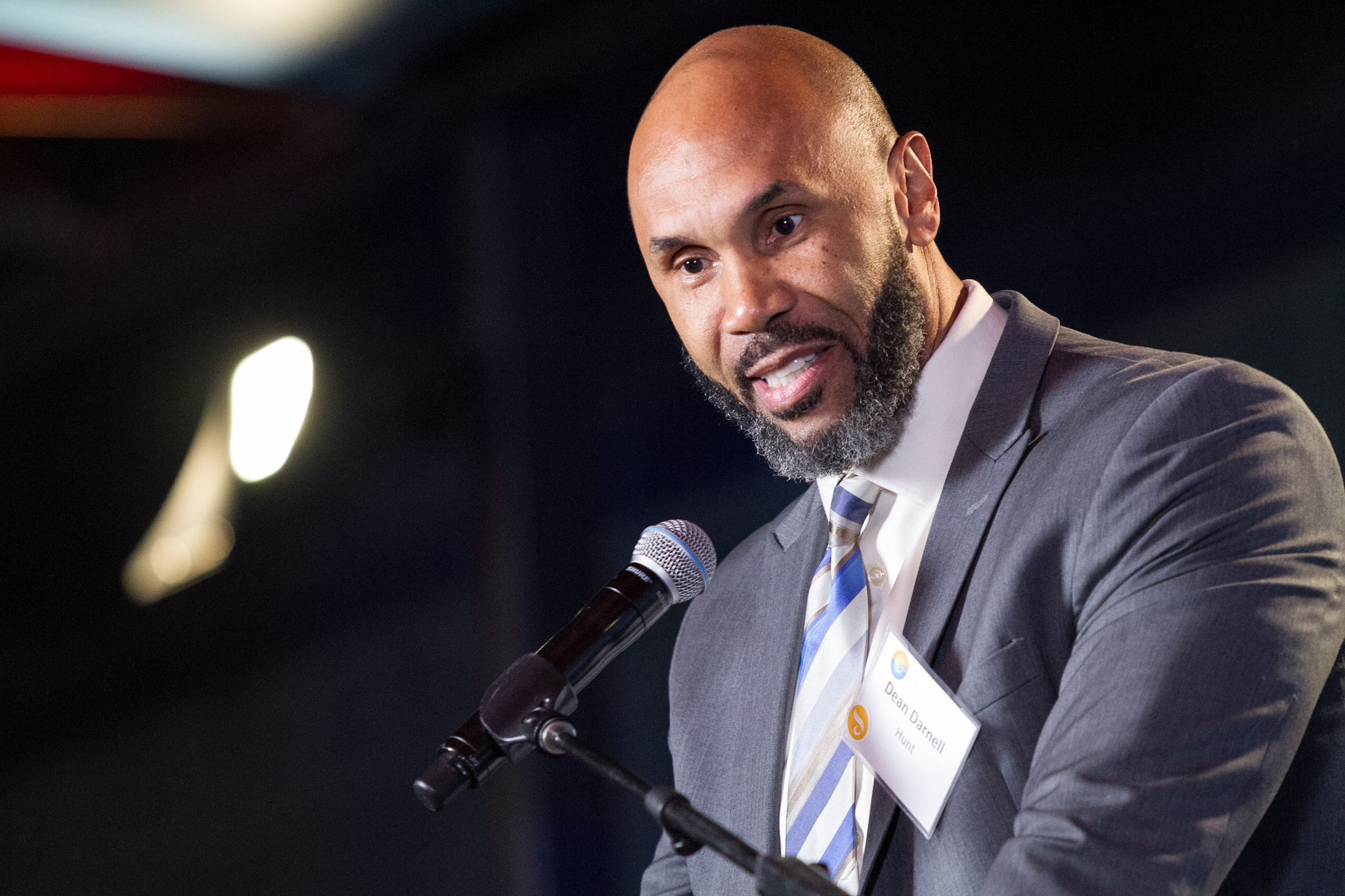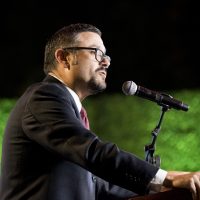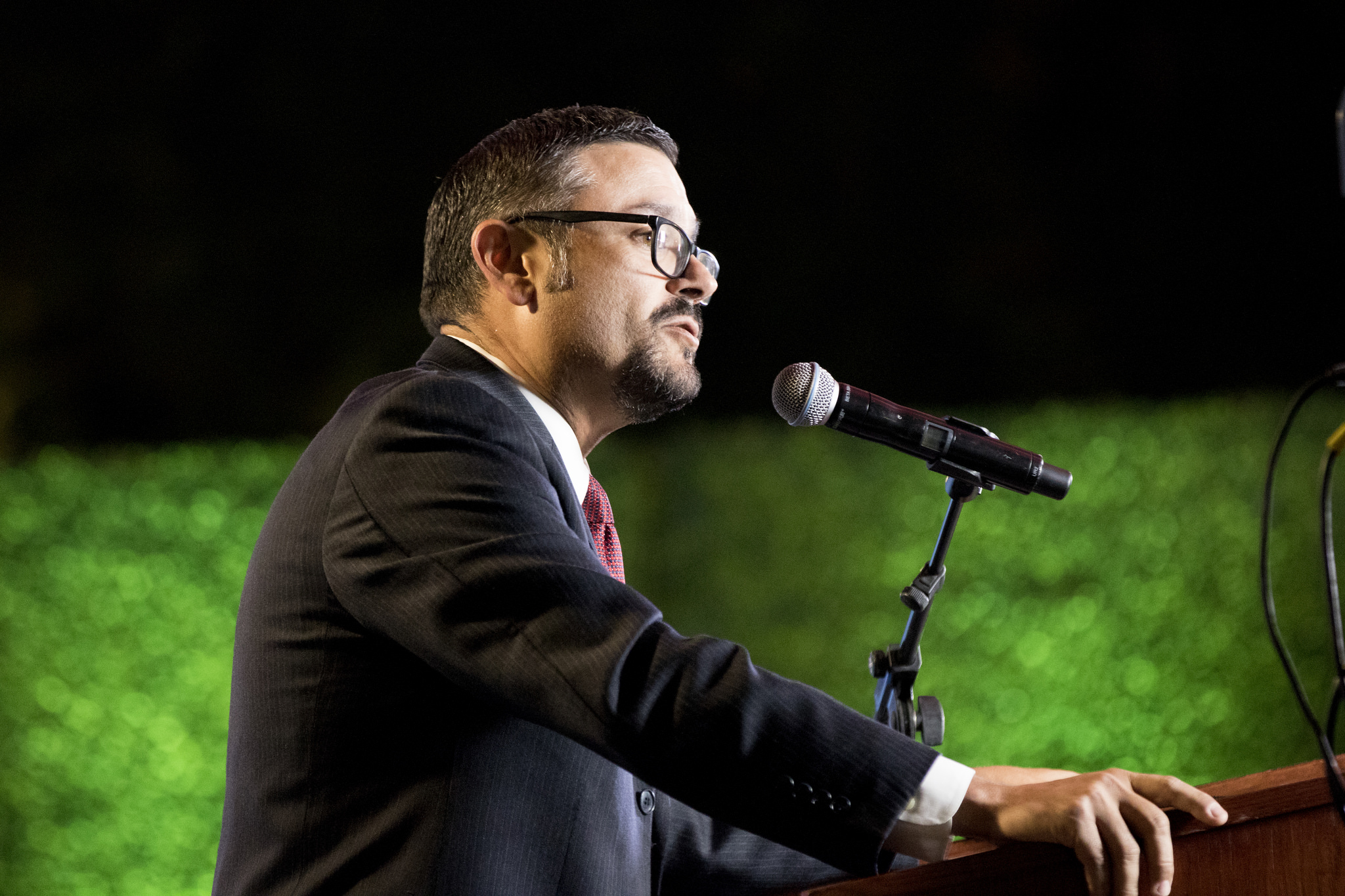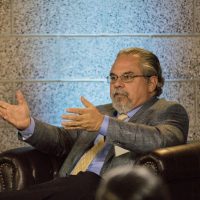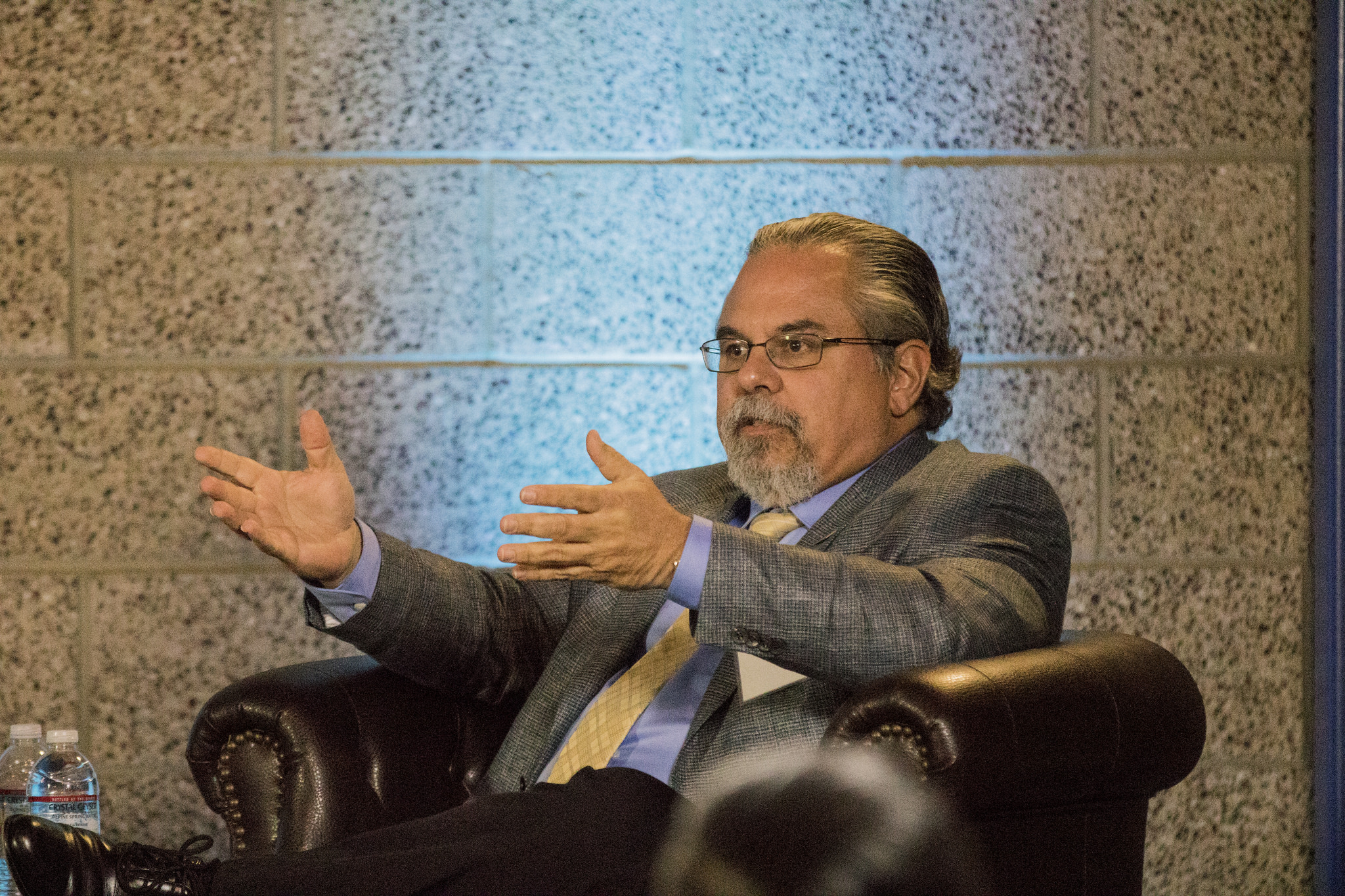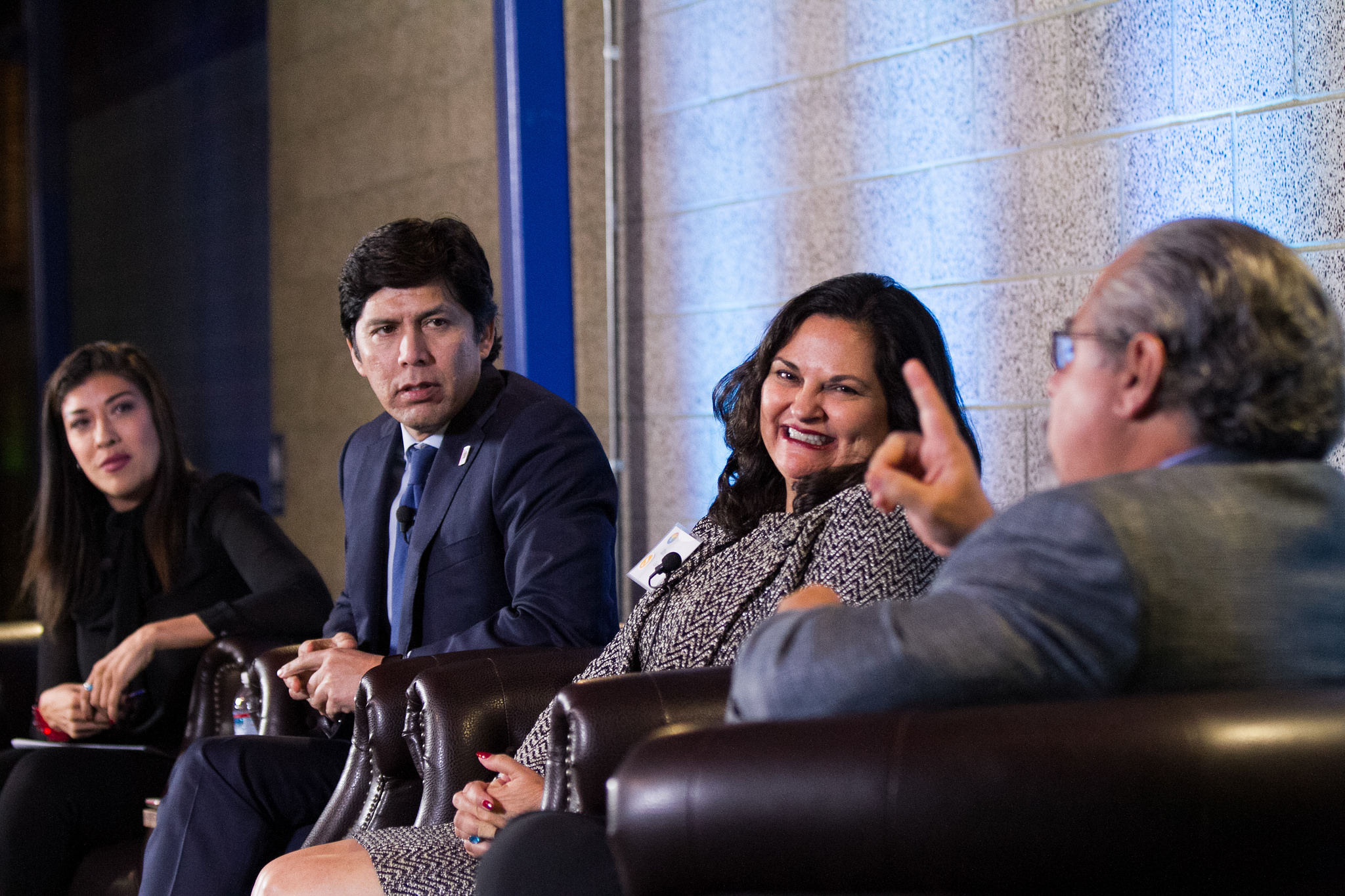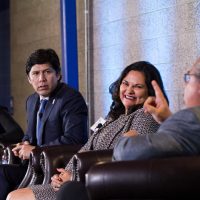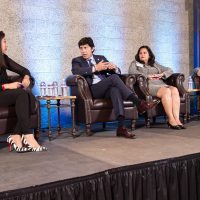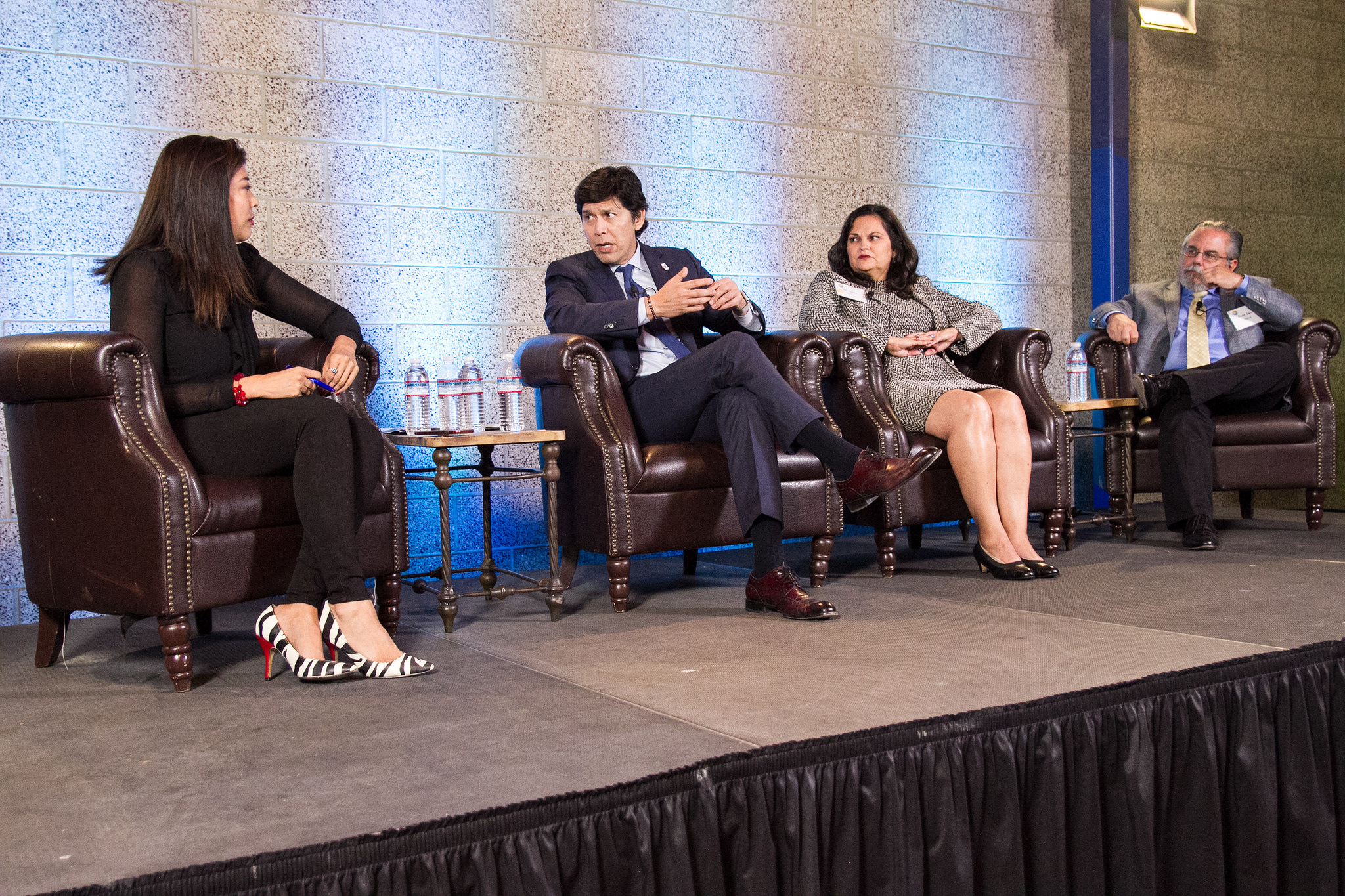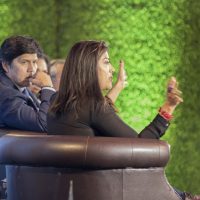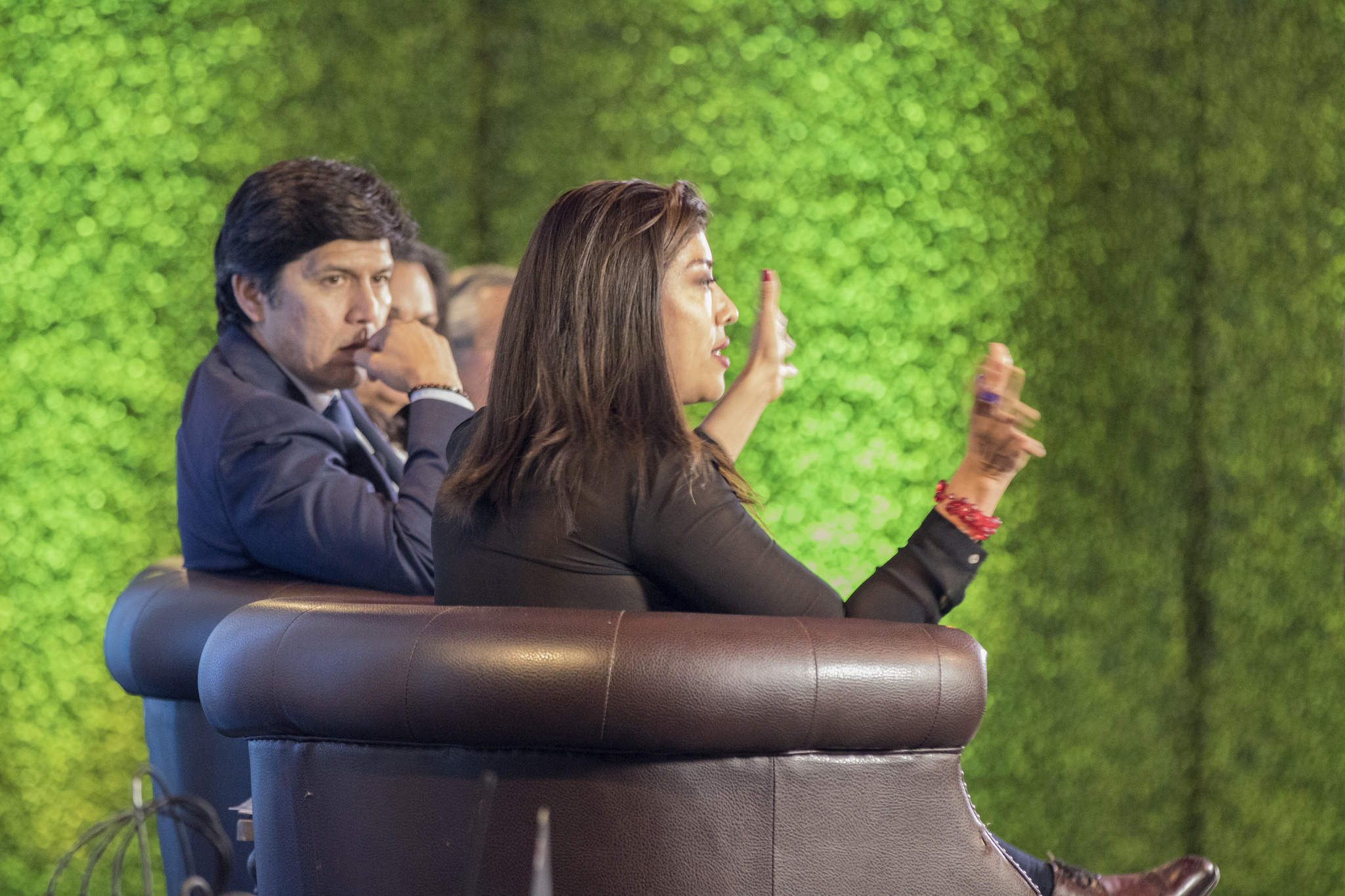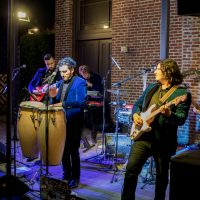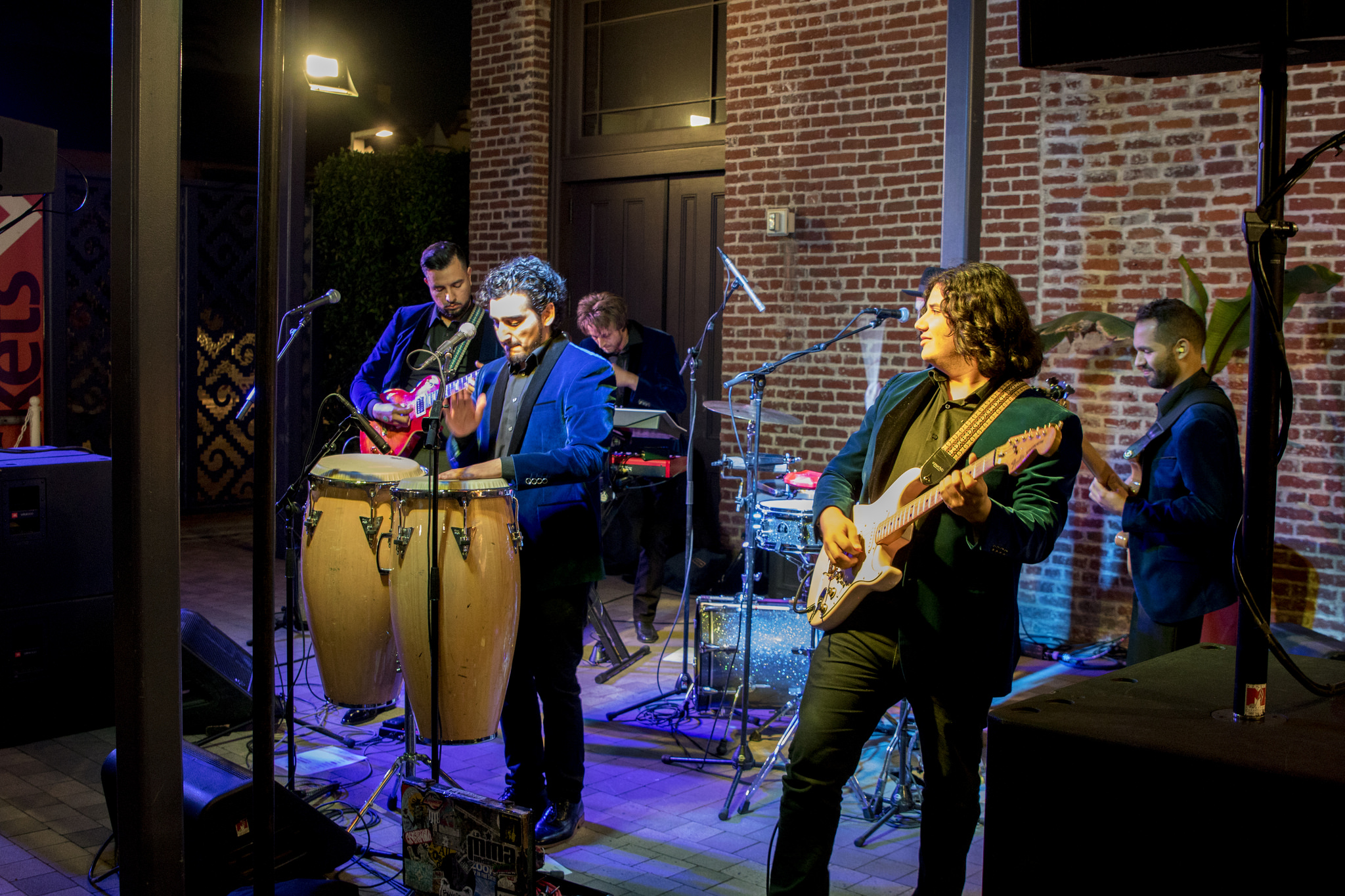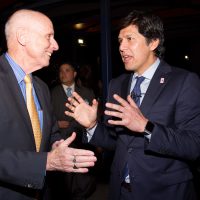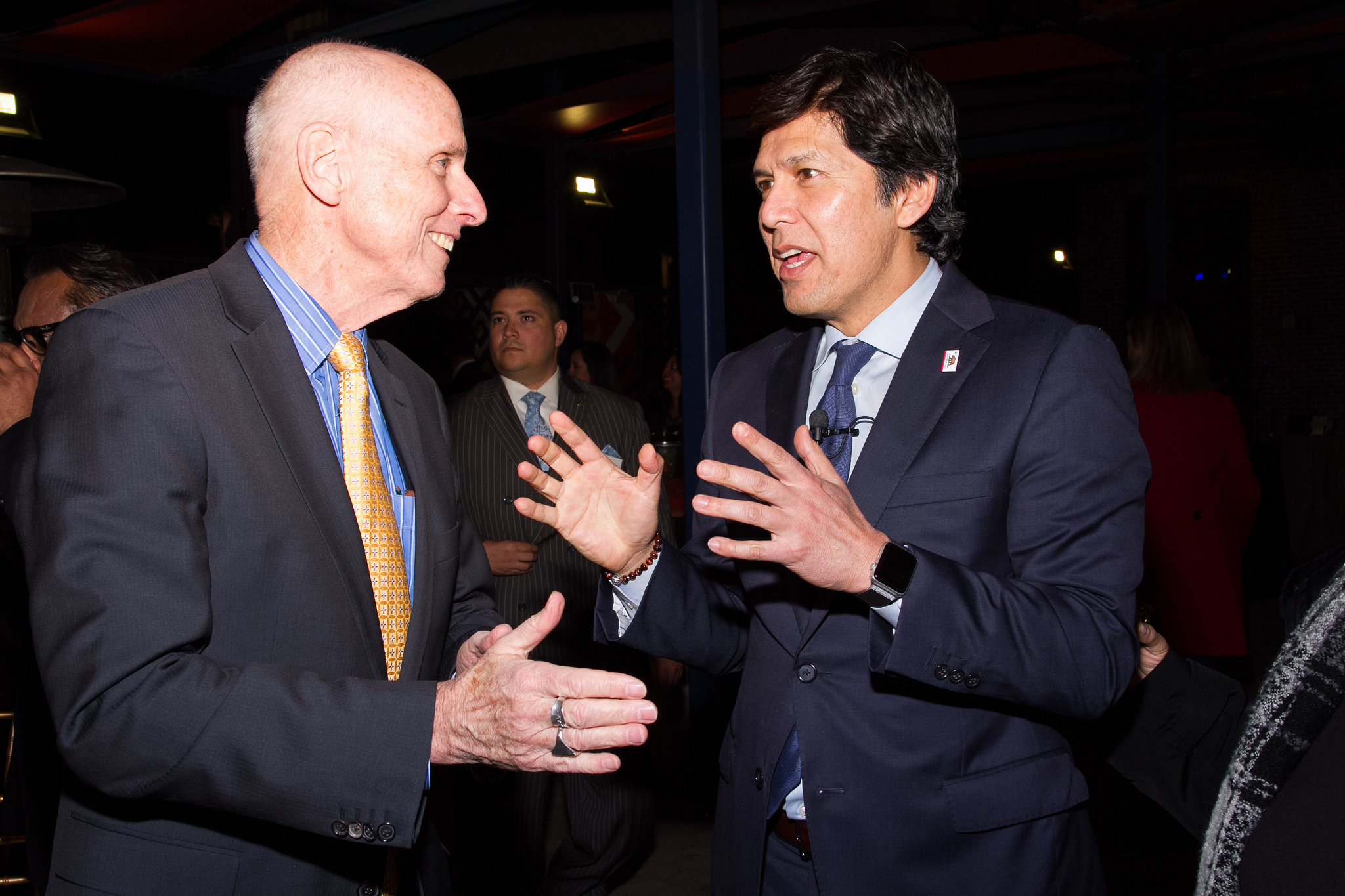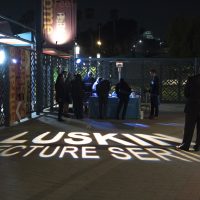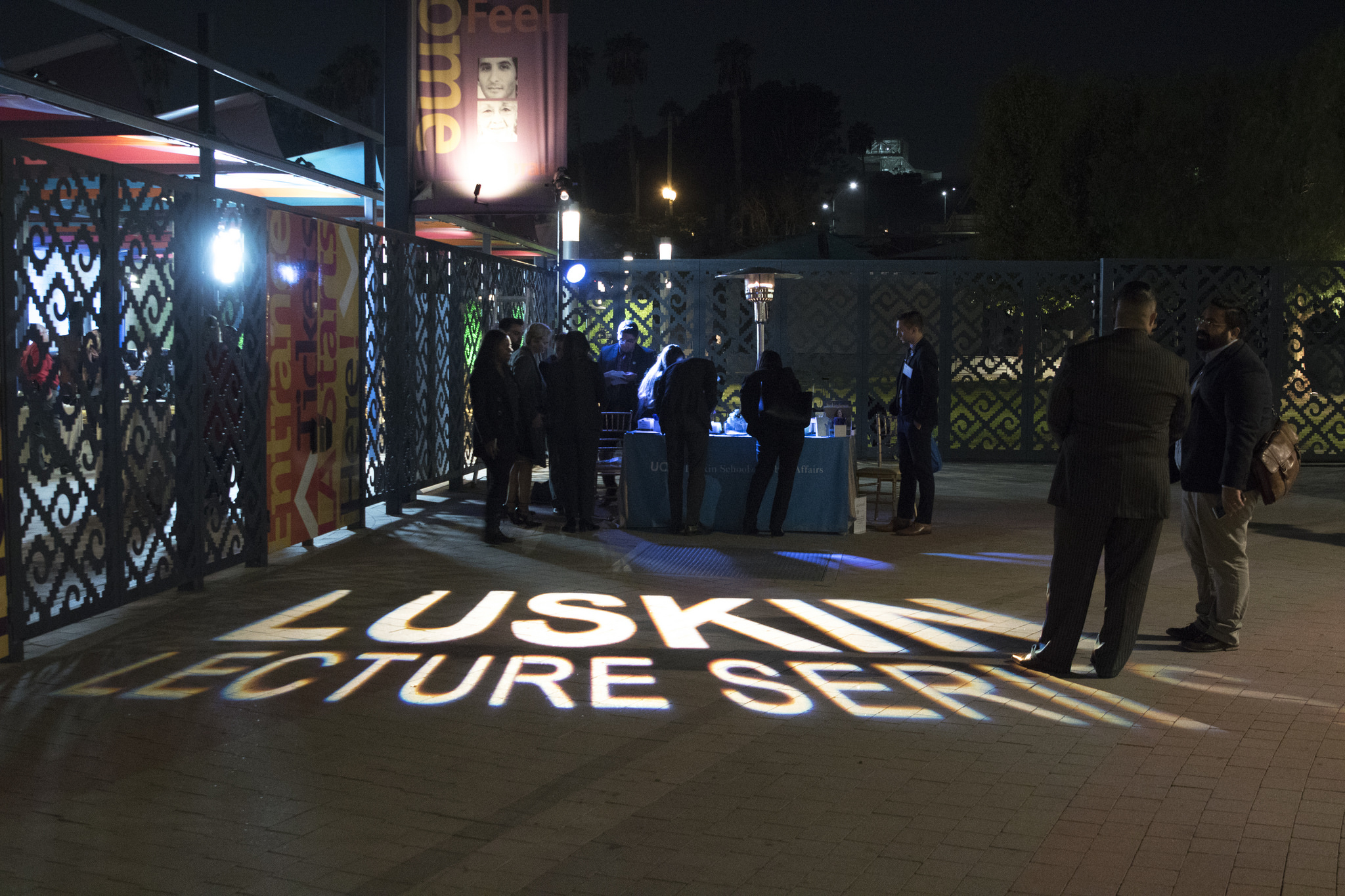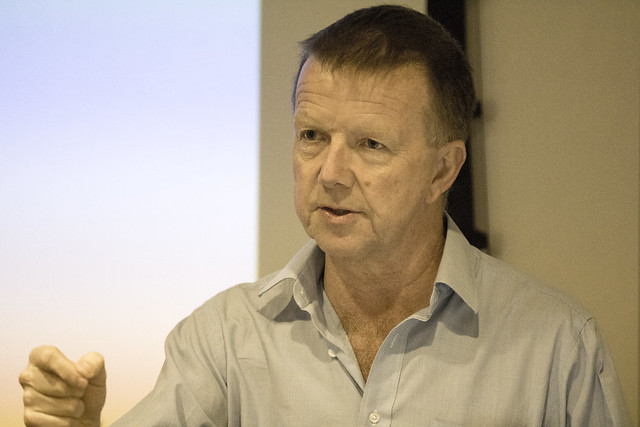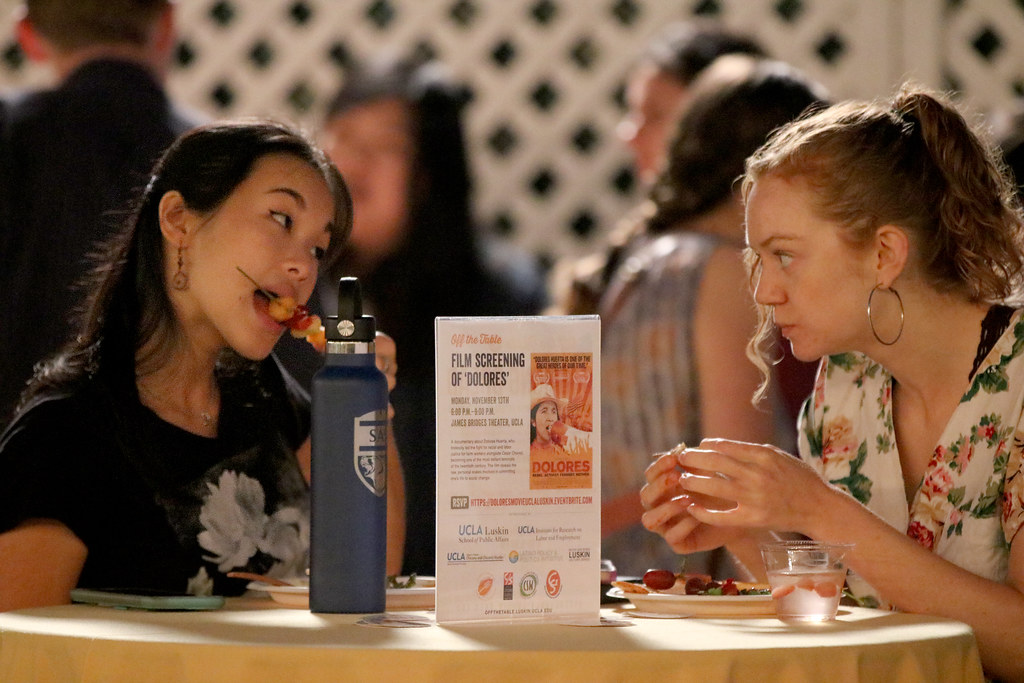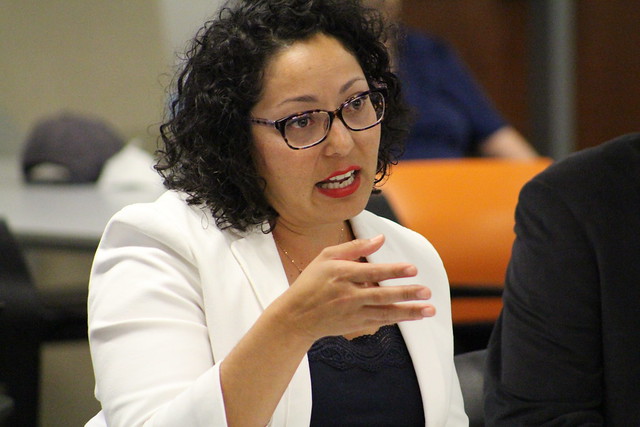Posts
KCRW President Emphasizes the Value of Open Dialogue UCLA Luskin Senior Fellow Jennifer Ferro stresses the good that can come just from a willingness to truly listen
/0 Comments/in Alumni, Diversity, Environment, For Policymakers, For Students, Public Policy, School of Public Affairs, Social Welfare, Uncategorized /by Les DunseithBy Les Dunseith
Jennifer Ferro was still a UCLA undergrad in the early 1990s when she landed an internship at KCRW, the public radio station in nearby Santa Monica.
“Jennifer had an internship that turned into a job,” noted Sarah Burtner, a second-year student in public policy at UCLA Luskin who helped introduce Ferro to a crowd of about 75 people, mostly students, who gathered Jan. 18, 2018, to hear Ferro’s Senior Fellows Speakers Series presentation. Ferro has been with KCRW for 25 years now.
“Millennials, on average, change jobs every three to five years, so this type of longevity is truly lost on us,” said Burtner with a smile.
Today, KCRW is the flagship public radio outlet in Southern California and Ferro is the station’s president. She is also an active participant in the UCLA Luskin Senior Fellows program, serving as a mentor for current students such as Burtner and Andres Carrasquillo of urban planning.
“We were drawn to Jennifer’s work at KCRW to help us understand how we might use the tools from the field of communication in thoughtful, engaging ways to help the public navigate the complexities of our fields,” Carrasquillo told the audience in the California Room at the UCLA Faculty Center.
Ferro’s presentation focused on a central question: “What role can public media play in making good people?”
“At KCRW and in public media, we do very high quality work. And I do think it matters that when your goal and your mission is to serve people and not to get the largest audience,” Ferro said. “It means that you attract people with integrity and talk to people who care about integrity.”
She leads a radio outlet that is among the nation’s largest, best-known and most prolific, producing more than 100 hours of public interest and music programming each week. Her station offers hard news reporting as well as feature coverage of trendsetters in fields such as food, art, Hollywood or culture.
“Most of all,” Ferro said, “we believe in disseminating truthful information — which seems like something that we would not even need to talk about, until recently.”
Ferro tailored her presentation in part to the policy interests of her audience, most of whom were from the UCLA Luskin School of Public Affairs. She noted, for example, that many people have the mistaken perception that public radio exists mostly on money doled out to stations by the federal government.
In reality, just 6 percent of the station’s budget comes via taxpayers. “KCRW receives close to half of its $20-million budget annually from individuals who decide, voluntarily, to support it,” she said. In all, about 55,000 people donate to the cause. The remaining funding “comes from sponsorship, or what we call underwriting,” Ferro explained.
She and her colleagues try to use those funds wisely, Ferro said, covering stories in ways that will enlighten listeners and broaden their perspectives.
Noting the overriding sense of political division in the country of late, Ferro played a couple of audio clips from public radio programs that tried to bridge the divide between left and right by including voices from both sides on controversial topics.
In one piece that aired prior to the 2016 presidential election, a woman who supported Donald Trump speaks of her beliefs, including the idea that radical Islamists had been infiltrating the country in large numbers with the intent of doing harm to Americans. An interviewer points out that white men have been responsible for the vast majority of terrorist violence in this country, but the woman refuses to believe him.
Ferro said this piece sticks out in her memory not because of the woman’s views but because of the reaction the interview generated among many listeners.
“If you are like me, you presume that people who listen to public radio are rational and reasonable — kind, even,” she said. “Of all the media consumers, public radio people would be like Canada, you know, tolerant and nice.”
Yet, after that interview aired, the woman who expressed her conservative views on air was flooded with hateful emails and tweets, including many that were vile — even death threats.
“One of the things I hear all of the time is that we just need to listen more to each other,” Ferro told the crowd. But when people with opposing views do try to communicate, “sometimes I feel that what we really want is to wait for them to stop talking so that we can then persuade them to think the way that we think.
“It comes from this notion, this concept, that ‘I’m right, and you’re wrong.’ But that’s what the other person is thinking about you too.”
As a Senior Fellow at UCLA Luskin, Ferro engages with students who benefit directly from her experience and efforts to expand their worldviews. She and other participants in the mentorship program provide other benefits too.
VC Powe, who organized Ferro’s talk as part of her role as director of career services at UCLA Luskin, generated a buzz among the crowd when she told them of a new donation by Edmund J. Cain, vice president of grant donations for the Conrad N. Hilton Foundation, that will provide $5,000 stipends to UCLA Luskin students who land summer internships that would otherwise be unpaid. The catch? The stipends can only go to students whose internships are somehow connected to a senior fellow.
That won’t be a problem at KCRW, which still offers internships like the one that first got Ferro her foot in the door there. Now, as station president, she continues to delight in the opportunity that public media provides for open, honest communication.
“We let people tell their own stories, in their own voices,” Ferro said, while urging that it’s important that all voices be heard. “Are we going to allow ourselves to hear things that we don’t agree with, that we think are absolutely wrong, that we find personally repulsive?”
She continued, “I think there’s a better goal in all of this, and it’s the goal of exercising our humanity. You should go and meet your neighbors. You should talk to people about anything besides politics,” Ferro said. “You should try to like people in spite of who they voted for.”
Workshop Focuses on Muslim American Scholarship
/0 Comments/in Luskin's Latest Blog Gary Segura /by Stan PaulScholars from around the United States gathered Dec. 15, 2017, at the UCLA Luskin School of Public Affairs to discuss research on topics such as understanding of Muslim American attitudes, sociopolitical behavior and identity. This was the second workshop — the first was held in 2016 at Menlo College — funded by a National Science Foundation (NSF) grant and organized by independent scholars Brian Calfano, Melissa Michelson and Nazita Lajevardi. The workshop brought researchers together to share, collaborate and exchange ideas on Muslim American scholarship and how to advance research in this multifaceted area. The group also discussed strategies and next steps to expand research such as a national study on Muslim Americans, according to the organizers. UCLA Luskin Dean Gary Segura and Matt Barreto, professor of political science and Chicana/o Studies at UCLA, were among presenters who shared tips and best practices. Segura, who holds appointments in public policy, political science and Chicana/o studies at UCLA, and Barreto are also leaders of the newly launched Latino Policy and Politics Initiative (LPPI) affiliated with UCLA Luskin. “Not only do scholars here examine Muslim Americans in their own work, the Luskin School has demonstrated its commitment to diversity and inclusion,” said Lajevardi, a 2009 UCLA graduate and political scientist set to join the faculty of Michigan State University. — Stan Paul
View a Flickr album from the workshop:
Launch of New UCLA Luskin Initiative Is True to Its Mission Event celebrating the creation of the Latino Policy and Politics Initiative brings UCLA community together with policymakers to share research and exchange information
/1 Comment/in Alumni, Diversity, Environment, For Faculty, For Policymakers, For Students, Global Public Affairs, Public Policy, Public Policy News, School of Public Affairs, Social Welfare, Social Welfare News, Sustainable Energy, Transportation, Urban Planning Gary Segura /by Les DunseithBy Les Dunseith
The newest research center at UCLA Luskin aims to bring together scholars and policymakers to share information so that political leaders can make informed decisions on issues of interest to Latinos, and its Dec. 6, 2017, kickoff event exemplified that goal.
Students, faculty and administrative leaders from the UCLA Luskin School of Public Affairs and throughout UCLA were among a crowd of about 175 people that also included elected officials, community activists, business leaders and other stakeholders who gathered in downtown Los Angeles to celebrate the launch of the Latino Policy and Politics Initiative (LPPI).
Attendees had an opportunity to hear keynote speaker Kevin de León, current president pro tem of the California Senate and a candidate for the U.S. Senate, talk about recent legislation on issues related to such diverse topics as labor, good government, the environment and education. He was then joined by a panel of experts in a spirited discussion of the current national political climate and major issues that directly impact Californians, particularly Latinos and other communities of color.
“In the great state of California, we celebrate our diversity,” de León told the crowd. “We don’t ban it, we don’t wall it off, and we sure as hell don’t deport it.”
In his speech, de León talked about the state’s efforts to deal with climate change, to improve education and to provide a safe haven for all residents. For example, Senate Bill 54, the California Values Act, which de León championed, creates a safe zone at “our schools, our hospitals, our churches, courthouses and other sensitive locations so our undocumented immigrant communities can live their lives and conduct their businesses without fear.”
De León declared, “If this president wants to wage a campaign of fear against innocent families, he can count us out. Because the state of California won’t lift a single finger or spend a single dime to become a cog in the Trump deportation machine.”
One of the goals of LPPI, which received its startup funding from UCLA Luskin and the Division of Social Sciences, is to provide better access to information — real data, not alternative truths — to help leaders nationwide resist attacks on immigrants and also help them to craft new policies on other issues vital to Latinos.
“It is impossible to understand America today without understanding the Latino community and the power that it wields. And this institute is going to do that,” Scott Waugh, UCLA executive vice chancellor and provost, told the crowd.
“It’s going to harness all of the intellectual capacity that UCLA has — it’s going to be truly interdisciplinary,” Waugh explained. The co-founders of LPPI — Professor of Political Science and Chicana/o Studies Matt Barreto, UCLA Luskin Dean Gary Segura and LPPI Director Sonja Diaz MPP ’10 — “have a vision that reaches not just inside the School of Public Affairs but reaches out across the campus in areas like health, education, science, the arts — wherever Latinos have made a difference and continue to affect change in a profound way.”
Darnell Hunt, dean of the Division of Social Sciences at UCLA, noted in his remarks that the founding of LPPI comes at a particularly opportune time in American politics. “It goes without saying that we live in challenging times — challenging political times — and the Latino Policy and Politics Initiative will help us make sense of this contemporary setting with an eye toward transformative solutions.”
Barreto, who served as master of ceremonies for the night, spoke about the scope of LPPI’s vision. “We’re not only going to work on immigration reform — we know that immigration reform affects our community and we will work on that — but we are dedicated to work on every policy issue.”
He added, “Whether it has to do with climate change or clean energy, transportation, housing, homelessness, criminal justice or education, we are going to work on that. And we have experts at UCLA who will join us.”
Many of the 20 scholars from across the UCLA campus who are part of LPPI’s faculty advisory council attended the launch event, which began with a networking reception at La Plaza de Cultura Y Artes near Olvera Street, the founding site of Los Angeles itself. As musicians from La Chamba Cumbia Chicha performed, attendees had an opportunity to meet and exchange ideas with the featured speakers and various former and current elected officials in attendance, such as Gil Cedillo, the former state senator and current Los Angeles city councilman. Also in attendance were former California assemblyman and senator Richard Polanco and Amanda Rentería, the former national political director for Hillary Clinton’s campaign and now a staff member in the executive office of California Attorney General Xavier Becerra.
The event wrapped up with a panel discussion and Q&A moderated by Lucy Flores, a former assemblywoman in Nevada who now serves as vice president for public affairs for mitú, a multimedia enterprise that targets young Latinos. Panelists said that bolstering the number of Latino elected officials has been a vital step in bringing about positive change.
“In the end, votes are what count,” Segura said, noting that Latino’s political influence has not kept up with its rapid population growth. “In order for governments to enact policies that benefit Latinos, it is going to be required that Latinos be a significant share of elected officials.”
Panelist Laura E. Gómez, professor of law at UCLA and former interim dean of the Division of Social Sciences, expanded on that idea in light of a recent wave of disclosures related to sexual misconduct by men in positions of power.
“I think it’s really important … for us to realize that Latinos are a diverse community. We are not just men; we are also women. We are not just straight people; we are also gay and transgender people. And those are important numbers going forward,” she said.
Flores summed it up, “Demographics is not destiny.”
The fact that California often seems to be an outlier in the current national political climate was a recurring topic of the night, with several speakers praising Californians’ resistance to the policies of the current U.S. president. Can the state also serve as a model of progress?
“Despite all of the discord and disunity, California is standing tall for our values,” de León said during his speech. “From education to the environment, from high wages to health care, to human rights, to civil rights, to women’s rights, to immigrant rights, California is proof positive that progressive values put into action in fact improve the human condition regardless of who you are or where you come from.”
De León said California is a leader in innovation — “home to Hollywood and Silicon Valley and the best public university system in the world, the University of California. And we are on the cusp of surpassing the United Kingdom for the fifth largest economy on planet Earth.”
The state is thriving, he said, by doing exactly the opposite of what Donald J. Trump says. “We succeed because we are dreamers, not dividers. We succeed because we double down on lifting people up, not putting them down. We are not going to allow one election to erase generations of progress.”
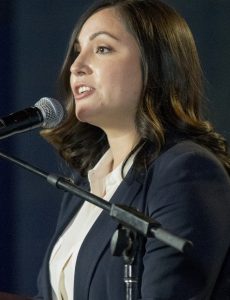
Photo by Les Dunseith
“I want to ask for your partnership, because this is what we need to do — we need to train a new leadership pipeline that is diverse but also represents us substantively,” LPPI Founding Director Sonja Diaz told the audience.
Saying that UCLA is “arguably the finest public institution in the nation, if not the entire world,” De León spoke enthusiastically of the promise that LPPI represents for elected officials such as himself. “We need the empirical evidence, and it’s about time we have this institution established at UCLA.”
Later, when speaking about climate change during the panel discussion, he expanded on the idea that knowledge equals power.
“California has the ability — if we have access to this type of information, this data — to export our policies to other states, even to red states that may not believe in climate change per se,” de León said. “We are showing that, whether you believe in climate change or not, you can actually grow an economy by delinking and decoupling carbon from GDP.”
Access to data is important, but it takes real leadership to turn information into action. “You can have all the academics in the world, all the data, but it doesn’t make a difference if it just sits in a book on a shelf,” de León said. “You have to take that data and move it with political power to actually implement it, execute it, to improve the human condition.”
Segura said it is his goal — and the mission of LPPI — to unite scholars and policymakers for mutual benefit, helping academics turn research into actionable policy.
“Facts do matter. Facts may not be a good way to sell people who don’t want to hear them, but lots of well-meaning elected officials want information,” Segura said. “One of the jobs of the institute is going to be to take the data out of those dusty books and put them in the hands of policymakers in a useful time frame so that policymakers can respond.”
The Latino Policy & Politics Initiative is a comprehensive think tank around political, social and economic issues faced by California’s plurality population of Latinos and other people of color. Anyone interested in providing financial support may do so through the UCLA giving page for LPPI.
Additional photos from the event may be viewed in an album on the UCLA Luskin feed on Flickr. Watch the video of our speakers and panelists.
Catalysts For Change
/0 Comments/in Luskin's Latest Blog, Uncategorized Stephen Commin /by Luskin StaffOn Nov. 1, 2017, Global Public Affairs @UCLA Luskin hosted a lunchtime talk with Duncan Green, an educator, writer and head of research at Oxfam GB, about power and how power systems shape global policy and change. As detailed in his latest work, “How Change Happens,” Green shared his expertise and knowledge gained through years of working with different institutions of power ranging from governments to grassroots social and political activists.
A Flickr album of photos from the presentation can be accessed below.
Festival, Panel Focus on Food Security Issues
/0 Comments/in Luskin's Latest Blog /by Les DunseithUCLA Luskin and the UCLA Food Studies Certificate program hosted a Food Week festival and panel discussion on food security issues on Oct. 26, 2017. “Harvesting Change: Fostering Partnerships for Food Security” was held on the 3rd Floor Commons of the Public Affairs Building and included food, games and information booths. The event segued into a panel discussion hosted by Urban Planning alumna Jessica McBride MURP ’14, founder of Open Silo and project manager for three6ixty. Fatinah Darwish, a program manager at the L.A. County Department of Public Health, Nutrition and Physical Activity, talked about county efforts to reduce food insecurity by increasing inter-agency coordination among government, healthcare and non-profit organizations. Mental health expert Rhea Holler, Ph.D., spoke about the shame and feelings of failure often experienced by people who are unable to afford food for themselves and their families. UCLA Luskin Senior Fellow Rick Nahmias, founder and executive director of Food Forward, talked about his organization’s history and its ongoing efforts to repurpose surplus food from fruit trees, farmers markets and other sources to provide hunger relief in Southern California. Attendees also heard from Frank Tamborello of Hunger Action LA, which is working to end hunger and promote healthy eating through a variety of advocacy, direct service and organizing efforts that benefit Los Angeles residents. Access a Flickr gallery from the event below.
Inside Look at State Politics
/0 Comments/in Luskin's Latest Blog Abel Valenzuela, Gary Segura, J.R. DeShazo /by Les Dunseith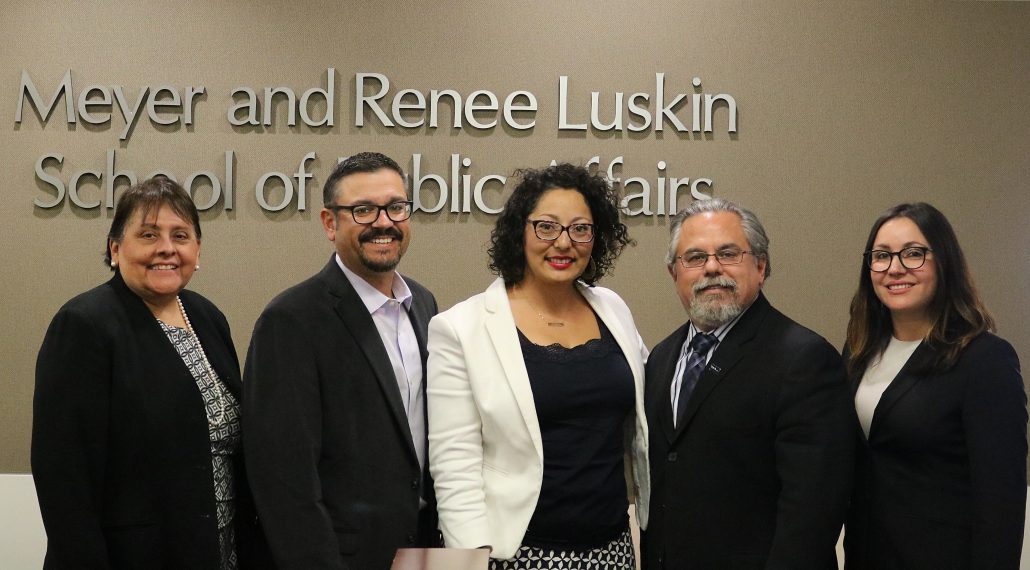
Cristina Garcia’s day at UCLA began with a meeting with Ramona Cortés Garza, executive director of UCLA State Relations, and LPPI’s leadership — Political Science and Chicana/o Studies Professor Matt A. Barreto, Luskin Dean Gary M. Segura and LPPI Director Sonja Diaz. They discussed how to leverage research to inform evidence-based policy solutions that are tailored to meet the needs of diverse Californians. Photo by Bryce Carrington
Cristina Garcia of the California State Assembly spoke about her efforts to make government more transparent during an Oct. 16, 2017, gathering at UCLA hosted by the Latino Policy and Politics Initiative. Garcia talked about the grassroots battle against political corruption in the 58th Assembly District in Southeast Los Angeles that eventually led her to seek office. “I’m an idealist at heart, and I do believe that we can have a democracy that works for us all.” Garcia talked about her three policy pillars: government transparency, women’s issues and environmental justice. She believes in standing up for the majority-Latino district she was elected to represent, but she envisions California as a place where every group of voters has equal input and access to the political system. She advocates for a more diverse and representative political system in which all Californians have an equal seat at the table. “For me, when I talk about where I want to see my society, we can’t shy away from race,” she said during a Q&A with students, staff and faculty from UCLA Luskin, the Division of Social Science, Grad Division, UCLA’s Early Academic Outreach Program, the Institute of Environmental Studies, and UCLA’s Government and Community Relations. “We can’t shy away from things that are real systemic barriers.” Although she faces hurdles when pushing many issues of importance to her constituents, she said that time and changing demographics are on her side. “Latino power is growing. We have had some losses and some steps back, but sooner or later we are going to be a majority,” Garcia said of California’s evolving population. “And we are also going to be a majority in those demographics in the State Legislature.”
Hover over the image below to access a Flickr gallery of photos.
Dean’s Message on DACA Decision 'You are not alone in this,' Segura writes in support of any undocumented Luskin students
/0 Comments/in Alumni, Diversity, For Policymakers, For Students, Public Policy, School of Public Affairs Gary Segura /by adminFriends, Colleagues, Alumni and Students:
I am heartsick to hear the announcement from the Trump administration that DACA will be ending unless there is some congressional action in the coming months. This decision flies in the face of good policy, the best interests of the United States, our moral obligations to one another, and simple human decency. In the long run, my sincere hope and expectation is that this decision will not stand, that our society will move forward toward a more reasonable and just outcome for these young people and, indeed, all members of our society whose status is an obstacle to a fuller and more complete participation in our economy and institutions. In the interim, we face a period of uncertainty, and for this I am deeply sorry.
For now, I want to make several things perfectly clear. First, to every undocumented Luskin student, you have my support. You are not alone in this, and I will continue my work (within the University and elsewhere) to push back on this odious turn in federal policy. Second, every Luskin student has my personal commitment to protect your privacy and educational records, consistent with U.S. law and the principles outlined by the UC-system in response to these events. Third, all of us have a special duty, in these circumstances, to redouble our efforts toward helping families and communities cope with the challenges presented by these and other events. And finally, know that your work and training are not in vain. Rather, it is in these moments that the tools of social science and a commitment to human well-being are in greatest demand.
I hope, in the near future, I will be able to address you with better news on this critical issue. Until then, to the ‘Dreamers’ among us — I will continue to admire your strength, your resilience, and your immense capacity to make change in this society.
In hopeful determination,

Gary M. Segura
Professor and Dean

Contact
UCLA Luskin School of Public Affairs
3250 Public Affairs Building - Box 951656
Los Angeles, CA 90095-1656
Campus Resources
Follow
The statements on this page represent the views of people affiliated with the Luskin School of Public Affairs and do not necessarily represent the views of the University of California, or UCLA or its Chancellor.
Posts and comments by individuals at UCLA on social media channels may not reflect the opinions or policies of UCLA, the University of California or the Luskin School, nor its benefactors and academic partners.
